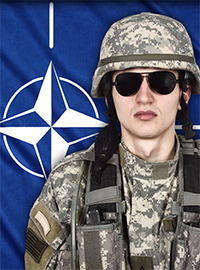| NATO to US: Yes, Sir, Mr. Trump |
 |
|
By Byron York
Tuesday, February 21 2017 |
Candidate Donald Trump set off a furious controversy when he said NATO countries should pay their "fair share" of mutual defense costs and, later, that the treaty organization was "obsolete" because not enough of its efforts were directed against radical Islamic terrorism. On Monday, Vice President Mike Pence took the Trump message to NATO headquarters in Brussels. And after all the controversy and complaining, NATO's response could be boiled down to a single sentence: Yes sir, Mr. Trump. News reports from Pence's news conference with NATO Secretary General Jens Stoltenberg focused on Pence's effort to "reassure" nervous NATO officials that the U.S. will stand behind its treaty commitments. "It is my privilege here at the NATO headquarters to express the strong support of President Trump and the United States of America for NATO and our transatlantic alliance," Pence said. "I can say with confidence, America will do our part." But at least as newsworthy was what happened next. Pence dropped the hammer of Trump's demands, and NATO quickly went along. "Europe's defense requires Europe's commitment as much as ours," Pence said. He reminded the group that in 2014 all 28 members of NATO promised to try to spend two percent of their GDP on defense by 2024. Only four countries, in addition to the U.S., are now meeting that standard. As a candidate, Trump repeatedly called for NATO to pay more, Pence noted. And now Trump is president. "So let me say again what I said this last weekend in Munich," Pence said "The president of the United States and the American people expect our allies to keep their word and to do more in our common defense, and the president expects real progress by the end of 2017. ... It is time for actions, not words." Just in case anyone missed the message, Pence encouraged the NATO countries that don't spend two percent on defense to accelerate their plans to get there. "And if you don't have a plan," Pence said, "get one." To which NATO quickly acceded. "I fully support what has been underlined by President Trump and by Vice President Pence today, the importance of burden sharing," Stoltenberg said. "I expect all allies to make good on the promise that we made in 2014 to increase defense spending and to make sure to have a fairer burden of sharing." On the issue of terrorism, Stoltenberg said yes again. First, he noted that NATO is helping train security forces in Afghanistan and Iraq and is contributing surveillance planes to the fight against the Islamic State. Then he added what Pence wanted to hear: "But we agree that the alliance can, and should do more, in the fight against terrorism." It's hard to overstate the near-hysteria that met Trump's "fair share" and "obsolete" comments. But the fact is, burden sharing is an old idea, and a non-controversial one. Modernizing NATO's approach in the age of the Islamic State is also eminently reasonable. And now NATO, facing the reality of a Trump presidency, has little choice but to go along. The bottom line is that Donald Trump moved the NATO debate. After much fretting, and complaining, and denouncing, NATO did the simplest thing: It went along. ---------------------------------------------------------------------------------------------------------------------------------------- |
Related Articles : |
























